
“Rejuvenated Silk Road, lasting friendship”
Niyazmuradov lkhtiyor Bahtiyorovich, Uzbekistan: “Chinese may be one of the most difficult languages, but if we study it diligently, then we are sure to get the hang of it. I also use little stories to teach about Chinese culture, such as how every chengyu(four-character idiom) has its own origin, so I’ll tell them about where the chengyucame from”.
What’s China really like in the eyes of foreigners? Which parts of Chinese culture are the most attractive? What are their personal experiences while learning Chinese language? Are there any touching stories that happened to them during their stay in China? You will find the answers here. After reading the following stories, don’t you have the desire to pick up your pen and put down something in Chinese about things around you?
By Niyazmuradov lkhtiyor Bahtiyorovich, Uzbekistan, Liaoning Normal. University Confucius Institute scholarship student.
When I was a child growing up in Uzbekistan, there was a period of time when my legs would often be sore, so my grandmother took me to the Andijan area, where there was lots of sand, and after putting my legs in the warm sand, I found the pain disappear. “What’s so special about the sand here?” I asked my grandmother in puzzlement. She told me that long ago a Chinese emperor’s daughter was sick, so he sent an envoy to travel along the Silk Road and retrieve the secret cure for her: sand. The envoy journeyed far and wide, and eventually found the precious sand. Just when he arrived at Andijan, a messenger from the emperor told him that the emperor’s daughter had already passed away, so the sand would be of no use. The envoy left the sand in Andijan, and returned to China. Later, many local Uzbeks discovered the incredible healing effects that the sand had on back and leg pains. Soon enough word got around, people from other parts of Uzbekistan who had similar problems flocked to Andijan for treatment. The effects were incredible, and this country with this amazing sand recipe must be mysterious too. What kind of place was China? I wondered in amazement.
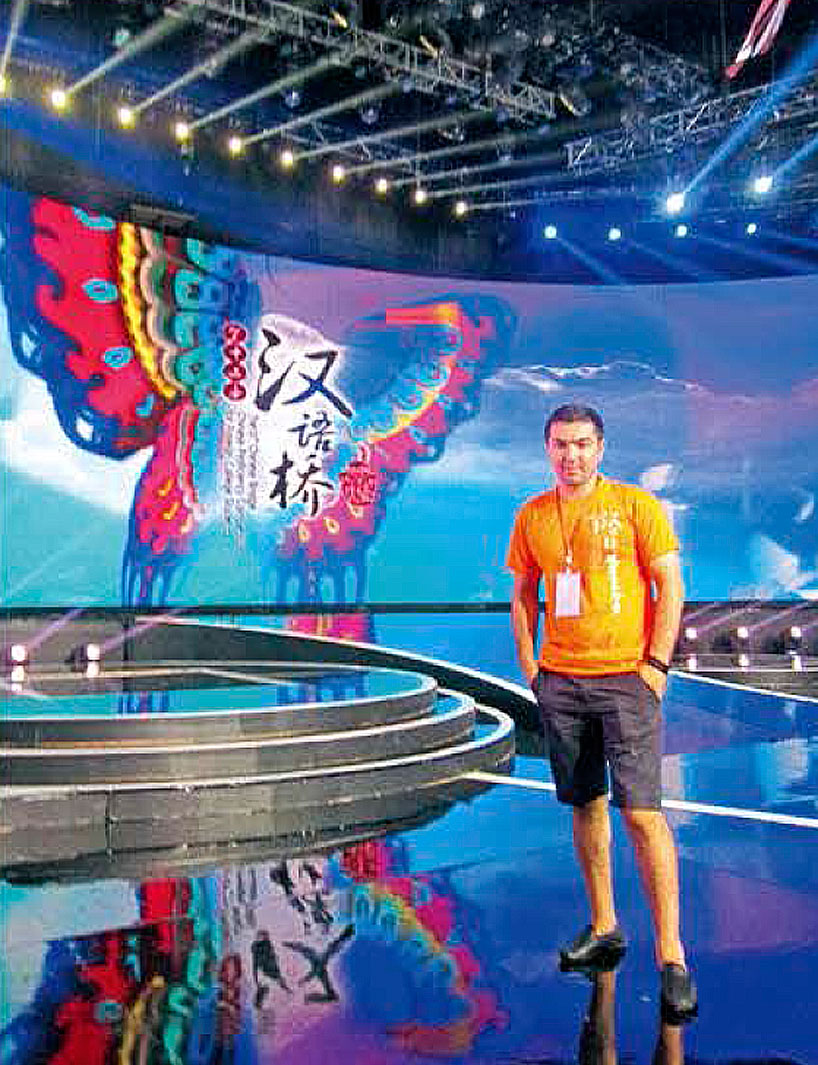
My grandmother noticed that I was interested in China, so she told me some stories about the country. Among them was the story of Farhad and Shirin by the Uzbek writer Ali-Shir Nava’i. In this Romeo and Juliet – style love story, Prince Farhad falls in love at first sight of the Armenian Princess Shirin. My grandmother told me that although Farhad was an Uzbek name, he was actually a prince from China. So Chinese people can have Uzbek names? If that’s the case, then can I have a Chinese name too? My childhood imagination began to grow.
On my ninth birthday, my grandmother gave me a book about Chinese kungfu . I was really into Bruce Lee and Jackie Chan at the time, and one day, without permission, I shaved my head and drew some dots on it, then put on a Shaolin-style robe, and imitated the martial arts moves from the book. Next to each of the images were some squarish-looking pictures. Huh? What are those? They didn’t look like Uzbek script, nor were they like English. With my curiosity piqued, I asked my mother, who was a school teacher, what those were, and she told me, “They’re Chinese characters, the script used in China. It’s one of the most difficult languages in the world. Only if you know Chinese will you be able to understand this book.” Wow! So this is the Chinese language! So if I knew Chinese would I be able to give myself a Chinese name? That was when I secretly resolved to learn Chinese.
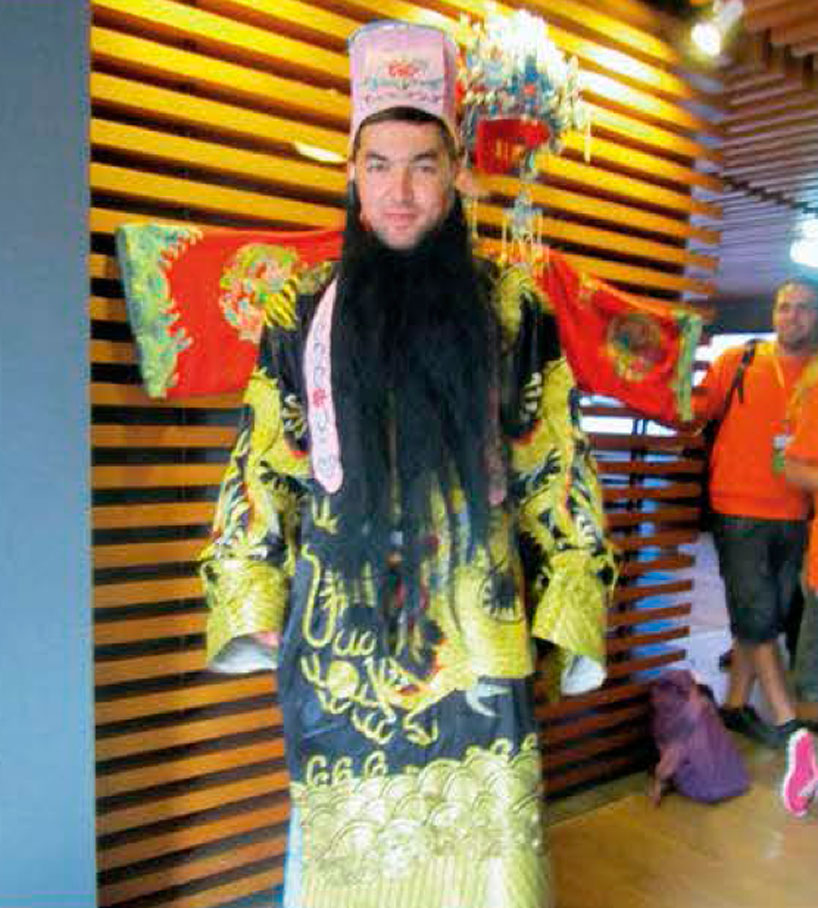
Later, when I was accepted into Tashkent State Institute of Oriental Studies, I had an opportunity to study in China. After I returned to my home school I became a Chinese language teacher. Today, every morning after I get up I practice taijiquan , then I go online and read the Chinese news. I use WeChat and QQ every day to chat with my friends, and listen to Chinese music. My favourite singer is Jay Chou, and the songs I’m best at singing are “Fairy Tale” and “The Moon Represents My Heart”. Now do I not only have a Chinese name, my life is inseparable from Chinese language and culture.
Every time I have the first class with new students, I always teach them a Chinese proverb: where there is a will, there is a way. Chinese may be one of the most difficult languages, but if we study it diligently, then we are sure to get the hang of it. I also use little stories to teach about Chinese culture, such as how every chengyu (four-character idiom) has its own origin, so I’ll tell them about where the chengyu came from. I also use jokes and humorous examples to explain the Chinese grammar, sentence structure and collocation. My favourite saying is “It is such a delight to meet friends from afar”; I tell my students that Chinese people are very warm and welcoming, and when we first meet them we may use this saying. There are so many things I want to tell my students, a seemingly infinite number of things.
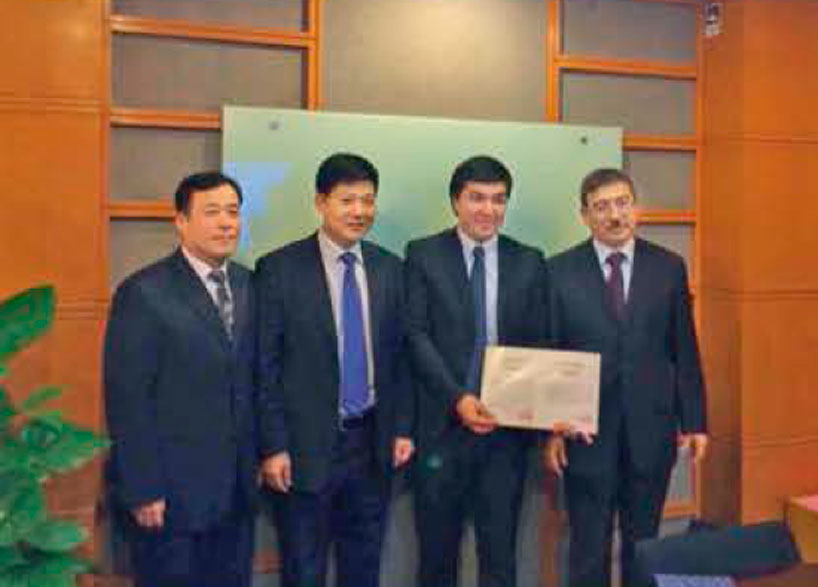
In 2013, Chinese President Xi Jinping proposed the establishment of the Silk Road Economic Belt. For Chinese language learners in Uzbekistan it was an extremely great opportunity. First of all, many schools in China were issuing the “Belt and Road” Scholarship, so it was very convenient for Uzbek students to apply to study there. Second, our school has established collaborative ties with numerous schools in China, so that outstanding teachers from China will often come to teach at our school, and in this way we can also obtain many precious textbooks and supplies. At the same time, more and more forums and symposiums related to the Silk Road Economic Belt are being held in Uzbekistan, which all of our teachers and students have the chance to participate in. After the policy to establish the “Belt and Road” Initiative was launched, more and more young Uzbeks became interested in Chinese. This reminds me of the days when I was a child. Then I made another secret resolution this time to help more young people learn Chinese, so as to bring new life to the ancient Silk Road.
Of course, more important was the fact that, since the proposal of the Silk Road Economic Belt was released, the concepts of “policy communication, infrastructure connectivity, trade link, capital flow, and understanding among peoples” that President Xi Jinping had put forward has taken effect in Uzbekistan. An increasing number of Chinese enterprises come to Uzbekistan to invest in building factories, and more and more enterprises from the two countries are making trade collaborations. Direct freight train lines from China to Tashkent have been opened, shipping Chinese products to Uzbekistan, and taking back raw and other materials from Uzbekistan. Soon enough, demand for Chinese language skills has reached an unprecedented high, and our students are highly sought after, but there are still not enough of them to meet demand. This has inspired many more young people to study Chinese, and our teachers all claim that they are busier than before, but all of them are full of motivation. True, we are busy, and tired, but we are happy!
Seeing the increasing number of students being able to fluently communicate with Chinese people in their own language, and witnessing the ancient Silk Road return to its past glory of East-West exchange over 1000 years ago, I recall my childhood memories of China, filled with all kinds of feelings. One poem in particular came to my mind, “My heart is young, and the sun and moon imbue me with inspiration. The great Silk Road has been rejuvenated, and the friendship will last forever.”
Published in Confucius Institute Magazine
Number 49. Volume II. March 2017.
Number 49. Volume II. March 2017.










.png)











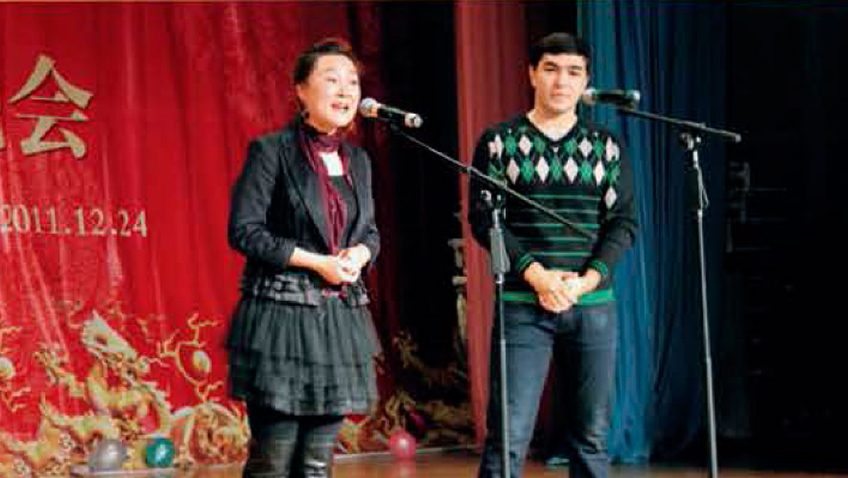
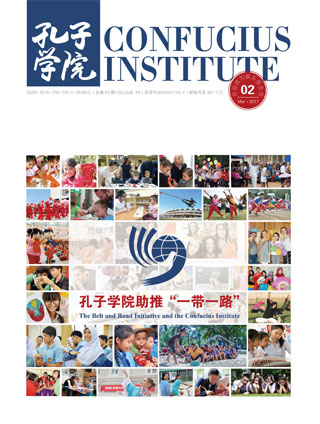
No hay comentarios:
Publicar un comentario